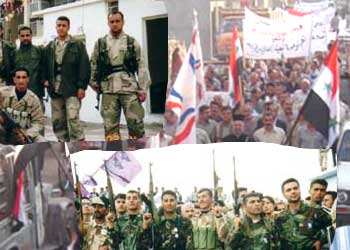


(AINA) -- Earlier this year, at the request of the local Assyrian (also known as Chaldean and Syriac) and Shabak communities of the Nineveh Plain, and the local police force of the Hamdaniya and Telkaif districts, the Ministry of Interior gave the order to assign approximately 800 new policemen from the local communities in the two Nineveh Plain Districts. This was long overdue as these two districts have a substantially low number of policemen to maintain security in the region. In addition, over fifty percent of the anemic police force in this region is made up of Kurds from outside the area who are loyal to the Kurdistan Democratic Party (KDP).
The first order from the ministry was handed down on March 14th, 2006. With a second official order dated April 6th, 2006, the approved applicants were asked to report for duty immediately. However, the Provincial Council of Nineveh, headed by Police Chief Wathiq Muhammad Abd Al-Qadir, has continually delayed the implementation of the ministry's order in the hopes of maintaining KDP control over the region. The Provincial Council of Nineveh is dominated by the Kurdish KDP even though the majority inhabitants of the area are Sunni Arabs, Shiite Shabaks, and ChaldoAssyrian Christians,
After several complaints from the locals, the order was finally implemented on June 14th, 2006, but with the modification that the Nineveh Plain approved applicants report for duty not in their Nineveh Plain hometowns but instead in the most troublesome neighborhoods in the city of Mosul.
The revised order gives the 800 Assyrian Christian and Shabak applicants two weeks to report for duty or their already approved applications will be revoked and rendered invalid. The Mosul city police stations where the new recruits are to report for duty already have assigned to them over 3,000 policemen from the Gayyara district. So far, none of the newly approved applicants have reported to Mosul in protest to the unjust alteration of the order to serve in Mosul rather than in their own towns and villages. Security personnel in the two Nineveh districts number a small fraction as compared to the 3,000 strong Police Force in the Mosul neighborhoods where the new recruits are to be deployed.
A complaint letter (English, Arabic) was formally filed with the Nineveh Provincial Council by the Assyrian and Shabak applicants, objecting to the revision to the order which only serves the political ambitions of the KDP and ensures its control over ever increasing parts of Nineveh and of its native inhabitants. No other region in Iraq has been subjected to such unreasonable demands. In all other urban centers and rural towns and villages the police forces are comprised mainly of local residents who man the local police stations and protect their hometowns.
With its usual aggression and political maneuvering, the KDP is betting that it can continue its dominance over the Nineveh Plain by infiltrating and controlling the police force. The KDP's excuse, which is rejected by the locals, continues to be that the locals are too afraid to police the area, and so they are forced to bring in KDP militia personnel from the outside. Such blatant suppression of the rights of Assyrians along with notorious KDP aggression have become the trademark of tribal warlord Masoud Barzani in the relentless pursuit of his dream of an independent Kurdistan. To be sure, Barzani has been listening to those who have been advising him that an independent Kurdistan is not viable without the oil-rich areas of Kirkuk and the Nineveh Plain.
Kurdish Prime Minister Nechirvan Barzani further demonstrates the KDP's plan to annex Assyrian and Shabak towns when he publicly labels them as "Kurdish towns". In his interview on June 3rd, 2006, Asharq Al-Awsat writes "He emphasized that democracy is part of everyday life in Arbil, Dahuk, Al-Sulaymaniyah, Ba'shiqah, Al-Qosh, Barzan, Bartalah, Zakho, and the remaining Kurdish cities and villages."
The head of the Political Bureau of the KDP and the Provincial Deputy Governor of the Nineveh Governorate, Khisro Goran, has set up KDP offices in even the smallest villages in the Nineveh Plain. He says of the blue-uniformed Iraqi police "They are not much good at finding terrorists...because they are terrorists themselves." In the December 15th General Election, in the Assyrian town of Bartilla, approximately 500 non-resident Kurds had entered the polling center at 11:30 a.m. and demanded to vote. When the director refused, Mr. Khisro Goran, ordered the director to allow the illegal vote. Over 200 voted by the time Coalition forces intervened to stop further illegal voting.

or register to post a comment.